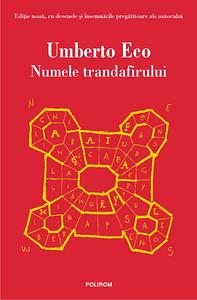Take a photo of a barcode or cover
challenging
dark
mysterious
reflective
slow-paced
Plot or Character Driven:
A mix
Strong character development:
Complicated
Loveable characters:
Complicated
Diverse cast of characters:
No
Flaws of characters a main focus:
No
challenging
mysterious
reflective
fast-paced
Plot or Character Driven:
Plot
Strong character development:
No
Loveable characters:
No
adventurous
dark
mysterious
reflective
medium-paced
Plot or Character Driven:
Plot
Strong character development:
Yes
How to talk about a mystery without spoiling its ending? I’d say that perhaps while I appreciate how this mystery functions and relates to the (as Eco referred to them) arias, at some point in the whodunnit the who explains why they dunnit and this, for me, felt a little flaccid, especially when thrown up against other, more material, goings on. On the other hand, the movement back and fourth between thoroughly researched medieval discourse (indeed, this book has a secondary utility as a catalogue of 14th century philosophy and history) and pulpy detective yarn works incredibly well for me. Very enjoyable to read. In a postscript, Eco is reluctant to flag any interpretations; he emphasizes The epistemological labyrinth, and the rhizome of Deleuze and Guattari. And that’s all well and good, but certain questions are answered in the course of writing anything, and they aren’t always questions about questions (even when the book is a book about books). In bringing about an Apocalypse in miniature Eco makes declarations as to causes, even where he denies it, and a the definite contours of his avowed chaos’s logic leave, I think, a little to be desired.
challenging
dark
mysterious
reflective
tense
slow-paced
Plot or Character Driven:
Character
Strong character development:
Complicated
Loveable characters:
No
Diverse cast of characters:
No
Flaws of characters a main focus:
Yes
Graphic: Misogyny, Antisemitism, Religious bigotry
Moderate: Death, Gore, Blood
If you have religious trauma this will likely be triggering
I finally finished this book! The beginning was a bit slowly paced, but after a hundred pages I began to really enjoy this story. It's definitely an interesting and unique murder mystery full of biblical and historical references. I did not understand everything to be honest and I cannot read Latin, but I really liked this extra layer. As I wrote earlier, it's very slow paced and quite difficult to understand, but I was intrigued by the story and curious about how it would end!
dark
mysterious
medium-paced
If you're not laughing every couple of pages, then stop reading—it's supposed to be funny.
The twist at the end (it is a murder mystery, after all) is among the top 3 of any book I've ever read. Unexpected, exiting, thought provoking and executed perfectly.
Some have said The Name of the Rose is the DaVinci Code for the literati. This is embarrassingly snobbish and unnervingly accurate.
Knowing some latin would have been nice, though...
The twist at the end (it is a murder mystery, after all) is among the top 3 of any book I've ever read. Unexpected, exiting, thought provoking and executed perfectly.
Some have said The Name of the Rose is the DaVinci Code for the literati. This is embarrassingly snobbish and unnervingly accurate.
Knowing some latin would have been nice, though...
dark
emotional
mysterious
reflective
sad
slow-paced
Plot or Character Driven:
Character
Strong character development:
Complicated
Loveable characters:
No
Diverse cast of characters:
No
Flaws of characters a main focus:
Complicated
First of all, I read this book to improve my intermediate-level Spanish. It probably was not the best book to start this process, not just because it is VERY long, but because it also uses archaic language being set in the 15th century.
The abbey itself is almost a character and the author spends a lot of time describing each part of the building. It also represents the Holy Roman Catholic Church as the time--huge, mysterious, designed and ornamented to to scare people into heaven, beautiful to look at but with rot and ugliness when inspected more closely.
The two protagonists are Adso and William. Adso is the narrator who is writing down the memories of his youthful novitiate days when he is old. He is the novitiate of William, a Franciscan friar. They are traveling throughout Italy, staying in abbeys both for theological discussion and so that William can look at their library.
William is very similar to Sherlock Holmes, using reason and deductions to figure things out. Adso is the son of wealthy parents who want him to follow the friar because they are supporting the Franciscans at the time. There is a lot of political intrusive going on in the Holy Roman Empire and the Holy Roman church. There is a rift between the Pope and the Emperor with both men accusing the other of heresy. The Franciscans and the Pope are also accusing each other of heresy.
When William and Adso arrive at this particular abbey, William has two goals: 1. To go through the library, which is the largest known library in Christendom. 2. To prepare the place for a meeting between the Franciscans and the Pope's emissaries to try and achieve a peace deal. The abbott gives him another job: determine if a young monk's suicide was really suicide or murder. He also forbids William from entering the library, saying it's forbidden.
The plot twists around like the labyrinth of the library. There are theological discussions. One death turns into more as each day another monk dies. Monks have theological disputes. There is a mysterious forbidden book that may or may not be at the center of the deaths. There is the meeting between the two Catholic groups. And in the middle of the story, there is an inquisition. And so many theological discussion of right, wrong, heresy or purity, etc.
This book has no warm, fuzzy moments. It is a dark satire with bits of gothic elements and a mystery to be solved by William and Adso. There are a lot of serious discussions that reflect, I think the ideas of the day. It is very slow paced at the beginning but speeds up as each day progresses.
While I enjoyed it well enough, I have no interest in reading it in English.
The abbey itself is almost a character and the author spends a lot of time describing each part of the building. It also represents the Holy Roman Catholic Church as the time--huge, mysterious, designed and ornamented to to scare people into heaven, beautiful to look at but with rot and ugliness when inspected more closely.
The two protagonists are Adso and William. Adso is the narrator who is writing down the memories of his youthful novitiate days when he is old. He is the novitiate of William, a Franciscan friar. They are traveling throughout Italy, staying in abbeys both for theological discussion and so that William can look at their library.
William is very similar to Sherlock Holmes, using reason and deductions to figure things out. Adso is the son of wealthy parents who want him to follow the friar because they are supporting the Franciscans at the time. There is a lot of political intrusive going on in the Holy Roman Empire and the Holy Roman church. There is a rift between the Pope and the Emperor with both men accusing the other of heresy. The Franciscans and the Pope are also accusing each other of heresy.
When William and Adso arrive at this particular abbey, William has two goals: 1. To go through the library, which is the largest known library in Christendom. 2. To prepare the place for a meeting between the Franciscans and the Pope's emissaries to try and achieve a peace deal. The abbott gives him another job: determine if a young monk's suicide was really suicide or murder. He also forbids William from entering the library, saying it's forbidden.
The plot twists around like the labyrinth of the library. There are theological discussions. One death turns into more as each day another monk dies. Monks have theological disputes. There is a mysterious forbidden book that may or may not be at the center of the deaths. There is the meeting between the two Catholic groups. And in the middle of the story, there is an inquisition. And so many theological discussion of right, wrong, heresy or purity, etc.
This book has no warm, fuzzy moments. It is a dark satire with bits of gothic elements and a mystery to be solved by William and Adso. There are a lot of serious discussions that reflect, I think the ideas of the day. It is very slow paced at the beginning but speeds up as each day progresses.
While I enjoyed it well enough, I have no interest in reading it in English.
slow-paced
Plot or Character Driven:
A mix
This was interesting, funny, deeply intellectual, and quite unlike most other novels I've read. I'm glad I persisted with it even when it felt a bit slow (I wish I had picked this up when I had a bit more time to get immersed in it, instead of reading it in bits and pieces over a couple of weeks!). I'd love to see an annotated edition of this book that translates all of the quotes and phrases in other languages, and gives a bit of background info to help those who aren't well-versed in the history of the Catholic church.
Graphic: Murder


